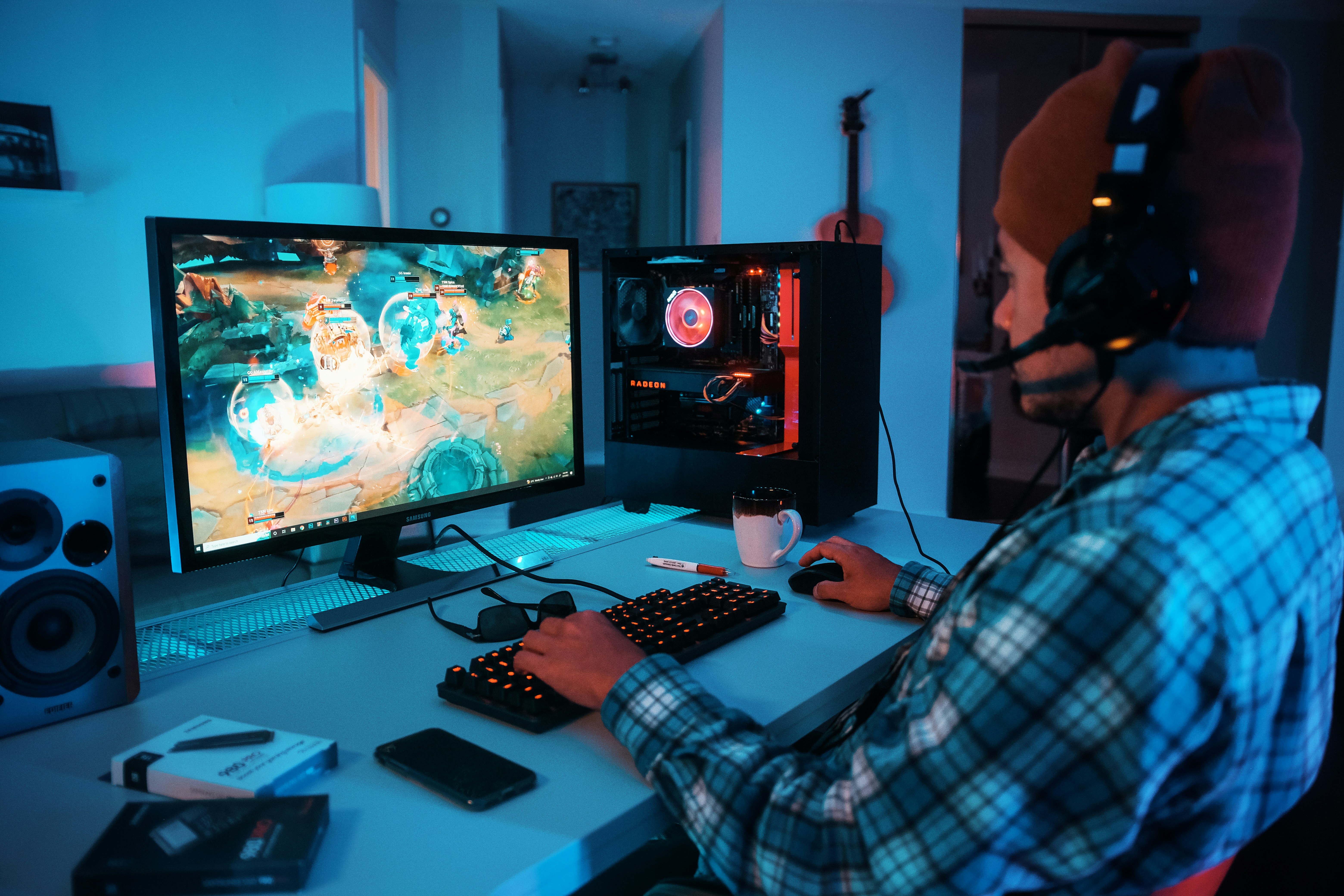This article discusses the dangers of online gaming addiction, including mental and physical health issues, strained relationships, and academic/career impacts. It also explores the role of social media in exacerbating these issues and the intersection of substance use and gaming. The article concludes by offering strategies for finding balance, such as setting limits, engaging in other activities, seeking support, and practicing mindfulness.
In a world where technology has become an integral part of our daily lives, online gaming has emerged as one of the most popular forms of entertainment. With millions of players worldwide, video games offer an escape, a chance to connect with others, and a platform for creativity. However, beneath the surface lies a hidden addiction and internet overuse that can be just as destructive as addiction to drugs or alcohol. Read on to learn more about the dangers of online gaming and the cons of computer games, the role of social media in exacerbating these issues, gaming addiction symptoms, and what gaming addiction treatment options are available.
The Allure of Online Gaming
Online gaming has transformed how we interact with others and engage with entertainment. From immersive role-playing games to competitive multiplayer experiences, there is a myriad variety. Players can easily lose track of time as they dive into intricate storylines, collaborate with friends, or compete against global opponents. This captivating nature of gaming is what draws many people in, often leading them to play for hours on end.
Why do people play video games? For some, gaming serves as a coping mechanism—a way to escape the pressures of everyday life. Whether it’s the stress of work, academic responsibilities, or social anxieties, turning to digital means can be a coping skill. However, it’s not always a good one. This refuge can quickly morph into a trap that leads to social media addiction or gaming addiction symptoms, often a combination of both.
Recognizing Internet Addiction Disorder Symptoms
As the hours spent gaming increase, so do the risks associated with addiction, and it becomes harder to quit video games. Recognizing the signs of online gaming addiction, also known as internet gaming disorder or IGU, and how much video games are too much is crucial for gamers and their loved ones. Some common indicators of gaming addiction symptoms include
- Neglecting responsibilities: An individual may begin to prioritize gaming over important tasks such as school, work, or family obligations. This neglect can lead to significant consequences in various aspects of life.
- Social isolation: While online gaming can foster connections, it can also lead to isolation from real-life relationships. Players may choose to spend time in front of a screen rather than engaging with friends or family. It can also lead to drug addiction and isolation.
- Withdrawal symptoms: Just like any addiction, withdrawal symptoms can manifest when a person attempts to cut back on gaming. These may include irritability, anxiety, or feelings of emptiness.
- Escalating time commitment: What may start as a few hours of gaming can quickly escalate to excessive playtime, often at the expense of sleep, health, and social interactions. There are many ways social media affects physical health, such as sleep loss due to social media or gaming.
- Loss of interest in other activities: As gaming takes precedence, individuals may lose interest in hobbies or activities they once enjoyed, further entrenching them in their gaming habits. Living without social media or gaming seems impossible.
If you or someone you know is exhibiting signs of electronic device addiction to any degree, it’s essential to take a step back and assess the situation. Understanding the potential dangers of online gaming and being familiar with technology addiction statistics can be a solid step toward regaining control.
The Dangers of Online Gaming and the Steps to Addiction
The dangers associated with online gaming addiction are multifaceted and can have lasting effects on an individual’s life. Below are some of the most significant risks.
Mental Health Issues
Prolonged gaming can lead to various mental health problems, including anxiety, depression, and social phobia. The digital world can create a false sense of achievement, leading to a decline in self-esteem when players struggle to perform or compete. Furthermore, excessive gaming can disrupt sleep patterns, resulting in fatigue and a decline in overall mental wellbeing.
Physical Health Consequences
Sitting for extended periods while gaming can have detrimental effects on physical health. Issues such as obesity, poor posture, and repetitive strain injuries can arise from long hours of inactivity. Additionally, neglecting physical activity can lead to cardiovascular problems and other health concerns.
Strained Relationships
As individuals become more absorbed in gaming and exhibit gaming addiction symptoms, they may unintentionally alienate friends and family. Relationships can suffer when one partner prioritizes gaming over spending quality time together. This strain can lead to feelings of resentment, loneliness, and ultimately, the breakdown of relationships.
Academic and Career Impacts
For students and professionals alike, online gaming addiction can have serious repercussions on academic performance and career progression. Poor grades, missed deadlines, and lack of focus can stem from excessive gaming, jeopardizing future opportunities.
The Role of Social Media
In recent years, social media has become intertwined with online gaming culture, amplifying the potential for addiction. Platforms like Twitch, YouTube, Facebook, and various social media channels allow gamers to share their experiences, showcase their skills, and connect with a broader audience. While this can foster a sense of community, it can also create an unhealthy obsession with validation and comparison. One can easily develop a Facebook addiction or social media problem along with gaming issues.
The addictive nature of social media itself cannot be overlooked. The need for instant gratification through likes and comments can mirror the rewards experienced in gaming, further intertwining these two forms of engagement. This overlap can create a perfect storm for addiction, where individuals are drawn deeper into both gaming and social media, ultimately leading to a more significant disconnect from reality. Video game addiction statistics report that up to 35 percent of the nation’s population needs help for gaming addiction or internet addiction.
The Intersection of Substances and Gaming
Another concerning aspect of online gaming addiction is its relationship with substance use. Many individuals may turn to alcohol or marijuana to enhance their gaming experiences or to cope with the stress and anxiety that can accompany addiction. This combination can create a dangerous cycle, where substances are used to escape reality, leading to increased gaming and further withdrawal from everyday life. One may need more concentrated treatment than a tech addiction rehab if their gaming addiction becomes intertwined with substances.
Alcohol can impair judgment and lead to impulsive gaming behaviors, while marijuana may alter perception and diminish motivation, making it difficult for individuals to recognize their addiction. This intersection of gaming and substance use can exacerbate mental health issues and lead to a host of other challenges, including addiction to substances themselves.
Finding Balance
Recognizing the dangers of online gaming is the first step toward finding balance. What to do if you’re addicted to gaming? You may try to restrict usage, look for online addiction support groups, or use a search engine to look for “video game addiction treatment near me.”
- Set limits: Establishing time limits for gaming can help create a healthier balance between online play and real-life responsibilities. Use timers or apps to track gaming time and ensure breaks are taken.
- Engage in other activities: Perform a social detox and rediscover hobbies or interests outside of gaming. Whether it’s sports, reading, or spending time with friends, diversifying activities can reduce gaming time.
- Seek support: If gaming has become overwhelming, seeking support from friends, family, online addiction support groups, screen addiction treatment, or professional counselors can provide valuable insight and encouragement.
- Practice mindfulness: Engaging in mindfulness practices can help individuals become more aware of their gaming habits and the emotions tied to them. Meditation, journaling, or simply taking time to reflect can foster a healthier mindset.
Online gaming can be an enjoyable and rewarding experience when approached with moderation and mindfulness. However, the hidden dangers of addiction are real and can have far-reaching consequences on mental, physical, and social health. By recognizing gaming addiction symptoms, gamers can take proactive steps to regain control over their gaming habits.
If you or a loved one is struggling with addiction, Mountainside can help.
Click here or call (888) 833-4676 to speak with one of our addiction treatment experts.

 By
By 







